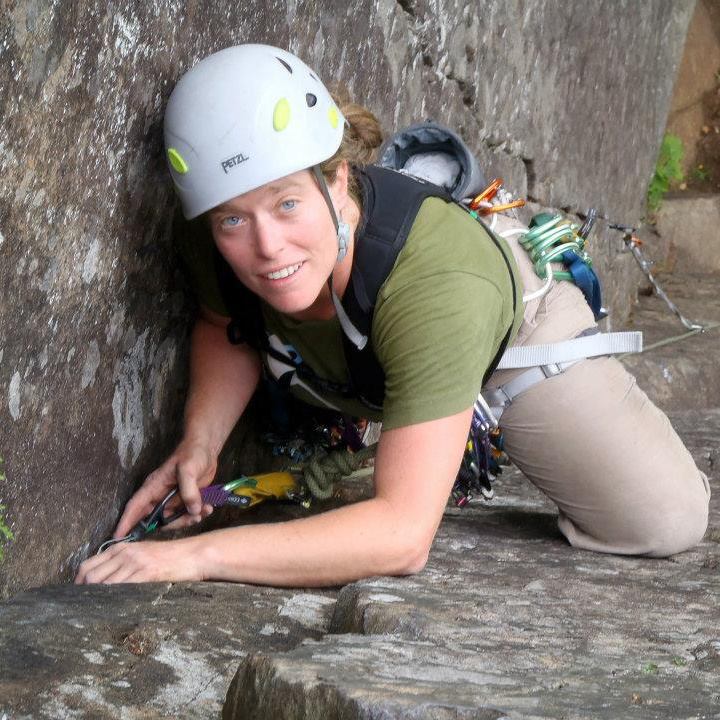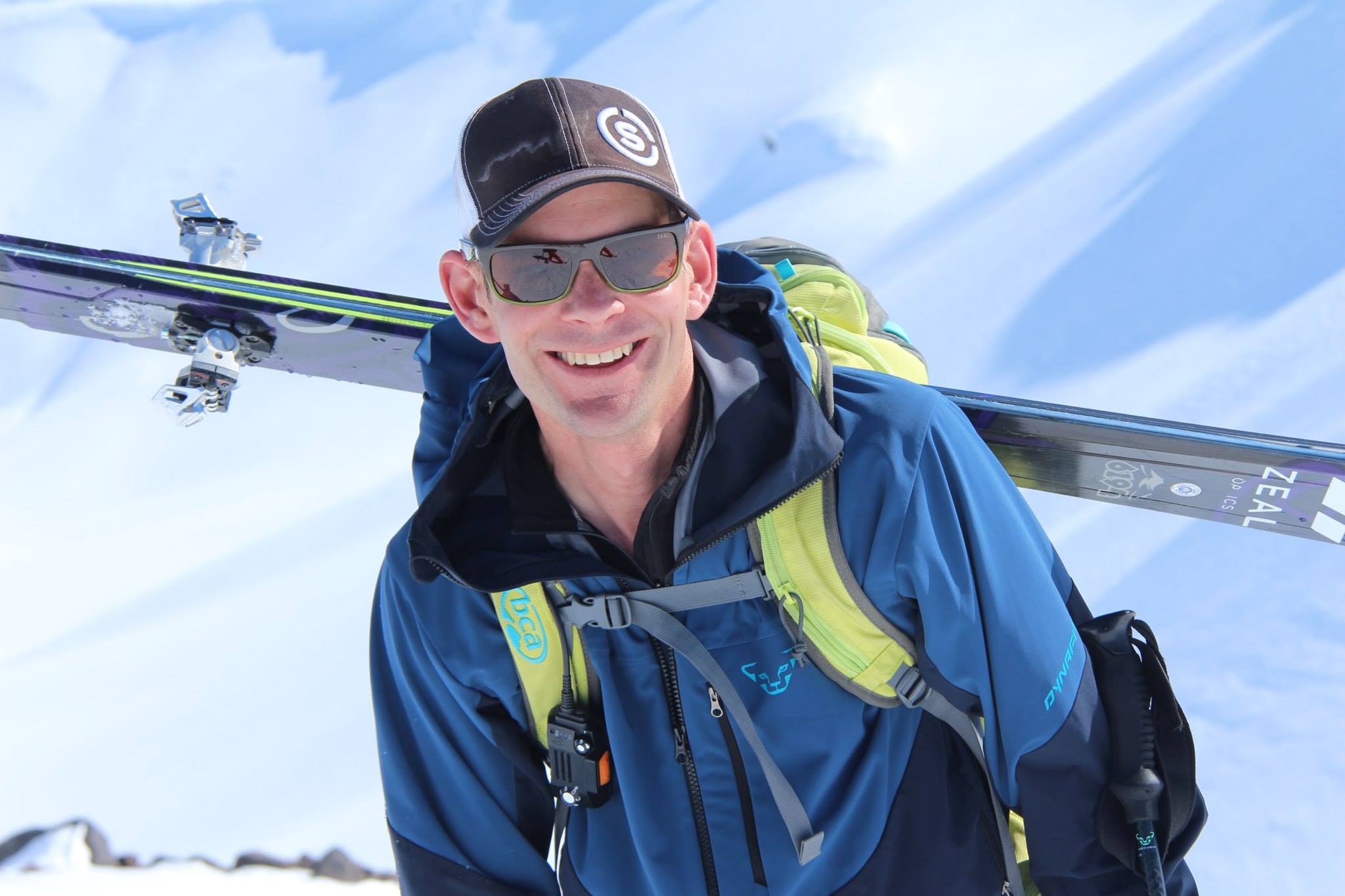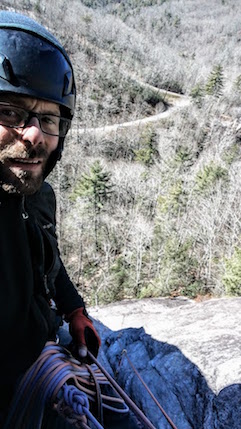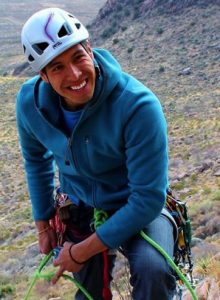
Mountain Guide Program Prerequisites
Please read through the following courses for prerequisites. Additional information about the application process can be found at https://amga.com/apply/ or by previewing the resume templates for each course: https://amga.com/mountain-guide-resume-templates/
Rock Guide Course
Prerequisites:
- Current AMGA member
- Current CPR Certification
- Current Wilderness First Responder (WFR) Certification or higher that meets the Minimum Guidelines and Scope of Practice for a WFR
- Five years personal rock climbing experience
- Confidence leading traditional and sport routes up to 5.9, at the time of the course
- Familiar with basic knots, including: figure 8, bowline, clove hitch, munter hitch, mule hitch, prusik, flat overhand, double fisherman’s and klemheist
- Familiar with multiple types of mechanical and non-mechanical belay devices
- Familiar with a variety of rappel devices on multi-pitch rappels
- Familiar with LNT Practices
- You have led 10 traditional climbs rated 5.10a or harder on various rock types (single or multi-pitch)
- You have led or shared lead on 50 multi-pitch rock routes (10 of which are Grade III or longer)
Advanced Rock Guide Course
Prerequisites:
- Current AMGA member
- Current CPR Certification
- Current Wilderness First Responder (WFR) Certification or higher that meets the Minimum Guidelines and Scope of Practice for a WFR
- Successful completion of the Rock Guide Course
- You are confident leading traditional and sport routes up to 5.10+/A2, at the time of the course
- Since completing the Rock Guide Course, you have led 10 different traditional routes rated 5.10+ or harder
- You have led or shared lead on at least 10 Grade IV or longer rock routes (5 of these have been completed since your Rock Guide Course)
- Since completing the Rock Guide Course, you have guided or mock guided a minimum of 20 rock routes Grade III or longer
Rock Guide Exam
Prerequisites:
- Current AMGA member
- Current CPR Certification
- Current Wilderness First Responder (WFR) Certification or higher that meets the Minimum Guidelines and Scope of Practice for a WFR
- Successful completion of the Advanced Rock Guide Course and Aspirant Exam
- Confidence leading traditional and sport routes up to 5.10+/A2, at the time of the exam
- Since completing the ARGC/AE, you have led or shared lead on 10 climbs that are rated 5.11a or harder (sport or traditional)
- Since completing the ARGC/AE, you have guided 20 days on multi-pitch routes. Of these 20 days, 15 can be mock-guided, 7 are Grade III or longer, and 3 are Grade IV or longer
Alpine Skills Course
Prerequisites:
- Current AMGA member
- Current CPR Certification
- Current Wilderness First Responder (WFR) Certification or higher that meets the Minimum Guidelines and Scope of Practice for a WFR
- For 2017/18: successful completion of an AMGA approved Level I, or Level I Avalanche Training and Avalanche Rescue Course
- For 2018/19 and on: successful completion of an AMGA approved Level I Avalanche Training and Avalanche Rescue Course
- For details on the new avalanche education framework being introduced in the 2017/18 season, please click here.
- Two years personal climbing experience on a variety of terrain that includes snow, rock and alpine
- Confidence leading 5.6 in rock shoes, at the time of the course
- Confidence on 3rd and 4th class terrain, in mountain boots, at the time of the course
- Competence in overnight backcountry camping
- Experience up to 10,000′ in elevation
- Familiar with basic knots, including: figure 8, bowline, clove hitch, munter hitch, mule hitch, prusik, flat overhand, double fisherman’s and klemheist
- Confidence placing traditional rock protection
- Familiar with multiple types of belaying techniques, including plates and assisted braking devices
- Familiar with ascending methods
- Familiar with mechanical advantage systems
- Familiar with LNT practices
- Documentation of lead or shared lead on 5 rock climbs rated 5.6 or harder
- Documentation of lead or shared lead on 5 ascents that include snow climbing
- Documentation of 3 overnight backcountry trips
Alpine Guide Course
Prerequisites:
- Current AMGA member
- Current CPR Certification
- Current Wilderness First Responder (WFR) Certification or higher that meets the Minimum Guidelines and Scope of Practice for a WFR
- Successful completion of an AMGA approved Level II, or Level I Avalanche Training and Avalanche Rescue Course
- For details on the new avalanche education framework being introduced in the 2017/18 season, please click here.
- Successful completion of the Rock Guide Course or the Alpine Skills Course (for non-IFMGA track guides)
- Confidence leading 5.8 in rock shoes and 5.6 in mountain boots, at the time of the course
- Confidence leading AI/WI 3, at the time of the course
- Confidence with French Technique on firm 40 degree snow, at the time of the course
- Familiar with basic knots, including: figure 8, bowline, clove hitch, munter hitch, mule hitch, prusik, flat overhand, double fisherman’s and klemheist
- Familiar with placing ice, snow, and rock protection and anchor construction
- Comfortable with the hip belay method
- Competence with map and compass
- Familiar with LNT practices
- Documentation of lead or shared lead on 25 different alpine routes in at least 2 different areas (e.g., Cascades and Alaska). Of these 25 routes, 10 are classic alpine routes rated 5.6 or harder and Grade III or longer, 5 include snow, ice or mixed climbing, and 5 are ice routes rated WI 3 or harder
Advanced Alpine Guide Course/ Aspirant Exam
Prerequisites:
- Current AMGA member
- Current CPR Certification
- Current Wilderness First Responder (WFR) Certification or higher that meets the Minimum Guidelines and Scope of Practice for a WFR
- Successful completion of an AMGA approved Level II, or Pro 1
- For details on the new avalanche education framework being introduced in the 2017/18 season, please click here.
- Successful completion of the Alpine Guide Course
- Successful completion of the Ice Instructor Course
- Confidence leading 5.10a in rock shoes and 5.7 in mountain boots, at the time of the course
- Confidence leading WI 4, at the time of the course
- Confidence with French Technique on firm 40 degree snow, at the time of the course
- Familiar with short roping, short pitching, lowering, rappelling, and the associated transitions
- Familiar guiding multiple clients, including managing two clients simultaneously on two ropes
- Comfortable leading in complex glaciated terrain
- Familiar with LNT practices
- Since completing the Alpine Guide Course, documentation of lead or shared on 10 different glacier routes with significant crevasse difficulty
- Since completing the Alpine Guide Course, documentation of lead or shared lead on 5 different alpine routes Grade IV or longer
- Since completing the Alpine Guide Course, documentation of lead or shared lead on 5 different ice climbs rated WI 4 or harder
- Since completing the Alpine Guide Course, documentation of 10 guided/mock-guided days in diverse alpine terrain
Alpine Guide Exam
Prerequisites:
- Current AMGA member
- Current CPR Certification
- Current Wilderness First Responder (WFR) Certification or higher that meets the Minimum Guidelines and Scope of Practice for a WFR
- Successful completion of an AMGA approved Level III, or Pro 2
- For details on the new avalanche education framework being introduced in the 2017/18 season, please click here.
- Successful completion of the Advanced Alpine Guide Course and Aspirant Exam
- Confidence leading 5.10a in rock shoes, at the time of the exam
- Confidence leading 5.7 in mountain boots, at the time of the exam
- Confidence leading WI 4, at the time of the exam
- Confidence with French Technique on firm 40 degree snow, at the time of the exam
- Familiar with LNT practices
- Since completing the AAGC/AE, you have led or shared lead on 5 different alpine routes grade IV or longer
- Since completing the AAGC/AE, you have led or shared lead on 10 different traditional style rock climbs rated 5.10a or harder
- Since completing the AAGC/AE, you have guided 10 days in diverse alpine terrain
Ski Guide Course
Prerequisites:
- Current AMGA member
- Current CPR Certification
- Current Wilderness First Responder (WFR) Certification or higher that meets the Minimum Guidelines and Scope of Practice for a WFR
- Successful completion of an AMGA approved Level II, or Pro 1
- For details on the new avalanche education framework being introduced in the 2017/18 season, please click here.
- Successful completion of the Alpine Skills Course or Rock Guide Course
- Four years personal ski touring experience, including multi-day tours and peak ascents
- Confidence skiing black and double-black diamond terrain, at the time of the course
- Ability to smoothly link turns in all terrain and conditions in un-groomed backcountry snow
- Ability to ascend and descend on skis an average of 4500′ – 6000′ + vertical feet per day
- Ability to adjust technique to ski in diverse terrain, including sustained descents of up to 50 degrees
- Experience snow climbing with ice axe and crampons
- Comfortable with self-arrest and belay
- Ability to choose appropriate belay and rappel methods for rock and snow
- Ability to navigate in whiteout conditions
- Proficiency with multiple burial avalanche rescue (ability to consistently locate 3 buried avalanche transceivers in under 10 minutes)
- Experience with winter camping and shelter construction
- Experience with basic short roping and pitching on snow and rock
- Experience with map and compass
- Familiar with LNT practices
- You have completed 20 different ski tours (5 of which are on terrain 40 degrees or steeper, 5 of which are day tours that include at least 4500 vertical feet of ascent and descent, and 5 of which are multi-day tours using huts or ski camping) – this will be documented in your submitted resume with your application.
- In 2019 the AMGA will begin to request submission of a movement video as part of the application process to the SGC.
- Movement video submission will be optional for 2019 SGC applications
- Movement video submission will be required for 2020 SGC applications
- For full details and what to put in your video, please read the SGC Video Submission Document
Advanced Ski Guide Course/ Aspirant Exam
Prerequisites:
- Current AMGA member
- Current CPR Certification
- Current Wilderness First Responder (WFR) Certification or higher that meets the Minimum Guidelines and Scope of Practice for a WFR
- Successful completion of an AMGA approved Level III, or Pro 1
- For details on the new avalanche education framework being introduced in the 2017/18 season, please click here.
- Successful completion of the Ski Guide Course
- Confidence skiing black and double-black diamond terrain, at the time of the course
- Ability to smoothly link turns in all terrain and conditions in un-groomed backcountry snow
- Ability to ascend and descend on skis an average of 6000 vertical feet per day
- Familiar with LNT practices
- Experience with glacier travel and crevasse rescue
- Ability to navigate in whiteout conditions
- Competence with map and compass
- Mastery of avalanche assessment skills and transceiver use
- Competence with sled rescue skills
- Competence with winter camping and shelter construction
- Competence with basic short roping and pitching on snow and rock
- Led or shared lead on 10 different alpine routes (2 of which include mid 5th class rock, snow, or ice)
- Since completing the Ski Guide Course, 10 different ski descents (5 of which are in complex glaciated terrain)
- Since completing the Ski Guide Course, you have guided/mock-guided at least 10 days in ski mountaineering terrain (documentation must include: dates, location, elevation gain and loss, total horizontal mileage, maximum slope angel and number of clients/mock clients)
Ski Guide Exam
Prerequisites:
- Current AMGA member
- Current CPR Certification
- Current Wilderness First Responder (WFR) Certification or higher that meets the Minimum Guidelines and Scope of Practice for a WFR
- Successful completion of an AMGA approved Level III, or Pro 2
- For details on the new avalanche education framework being introduced in the 2017/18 season, please click here.
- Successful completion of the Advanced Ski Guide Course and Aspirant Exam
- Confidence skiing black and double-black diamond terrain, at the time of the exam
- Ability to smoothly link turns in all terrain and conditions in un-groomed backcountry snow
- Familiar with LNT practices
- Mastery of glacier travel and crevasse rescue techniques
- Mastery of all elements of navigation, including the ability to route find on complex glaciated terrain
- Mastery of whiteout navigation, including the use of current technologies and map and compass
- Since completing the ASGC/AE, 10 guided days in ski mountaineering terrain (5 of these days are allowed to be mock-guided)
- Since completing the ASGC/AE, 10 personal ski descents (5 of which are in complex, glaciated terrain and 5 of which are on slopes 45 degrees or steeper)
- Documentation of guided days and descents must include: dates, location, elevation gain and loss, total horizontal mileage, maximum slope angel and number of clients/mock clients
- Students may not take the Ski Guide Exam in the same venue as they took the Advanced Ski Guide Course/AE












